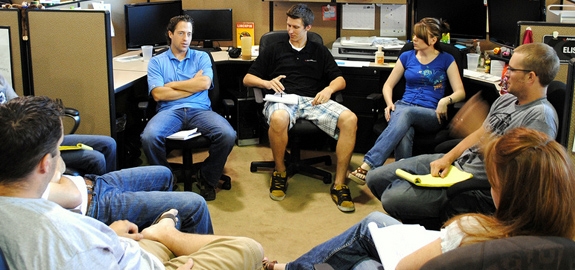This article by Hollis Thomases originally appeared on Inc.com on September 24, 2012.

Hiring help with your digital marketing efforts? Start your relationship right by making sure you’re in sync on these key points.
As a digital marketing consultant and strategist, I’ve both observed and been part of a variety of client-service provider relationships: both great ones and those that are “less than favorable.”
There are a lot of factors that shape this particular client relationship-with the potential to make it disastrous, extraordinary, or something in between-but I think there are four critical elements:
- Expectations
- Communication
- Education
- Trust
Clearly understanding where you and your digital agency stand on these issues has everything to do with whether you get what you’re seeking out of the relationship.
Let me elaborate further.
1. Expectations
Misaligned or falsely generated expectations are probably the No. 1 reason that an agency-client relationship fails-and, frankly, both sides are usually to blame. The client starts out expecting unrealistic outcomes, and the agency fails to correct that expectation, for fear of losing the business. It’s a recipe for failure.
As a client, here’s what you can do to avoid misaligned expectations and failing outcomes.
- Develop informed Requests for Proposals: RFPs, the necessary-evil precursor to many advertising and marketing relationships, are often written so vaguely that they can be easily misconstrued by responding agencies. As a result, the client can’t evaluate responses fairly. (The computer programmers’ acronym GIGO-”garbage in, garbage out”-often applies here.)
- Produce a project or creative brief ahead of time: Go through the process of developing a project or creative brief-also known as a scope of work-before you hire outside help. That way you can more clearly define for the agency exactly what you’re looking for, and what the project’s parameters, timetables, and milestones of the project will be. It also can provide helpful background information.
- Define metrics (or admit you don’t know them and invest in figuring them out): Put into your project brief the metrics by which you will measure success or accomplishment. These metrics should not be something you pull out of thin air, but should be based on proven data. If you don’t know your metrics, don’t expect an agency partners to know them for you either. They can work to solidify them for you, but then that should be communicated as part of the scope of work.
- Budgets, allocations and expenses: You need to provide an agency with some realistic budgetary direction. How much of your budget do you want to go toward branding your company or product, and how much should go to direct response (driving sales or leads)? Is your budget figure supposed to include all service fees? If your agency is not local, how often do you expect face-to-face meetings-and how should they handle travel expenses for these visits?
- Clarify the agency’s role: Are you looking for a partner who’s strategic, tactical, or a combination of both? Don’t assume going in that your agency will do both well. Know where you need the most help and look for that strength.
2. Communication
I can’t stress enough how important communication is to a great agency-client relationship. Both parties have an obligation to have open and direct communications. When it comes to digital, remember, it’s important to bring all the players to the table: marketing, sales, and IT, as well as agency contacts. Everyone should be aligned with the goals and the initiatives.
Communicating a list of past agency-client pain points also helps you avoid repeating them with a new partner, so take some time to develop this kind of list ahead of time. Both parties should also establish and convey the protocol for communications, defining who will be the primary point(s) of contact.
3. Education
Personally, I believe an educated customer is my best customer. Educating helps with establishing expectations and solid communications, but it also makes everyone involved in a project that much better at their job.
As the client, however, you should also be educating yourself about your market-and sharing that information with your agency partner. You can improve decision-making efficiency and avoid wasting time by providing your digital strategists with upfront research about your market, target audience, and competitors.
4. Trust
If all of the above is done well, a natural trusting relationship will develop. It’s this kind of working relationship that will last longer and be more prosperous for both parties. Your digital partner will feel more secure in bringing up issues and ideas to help advance your efforts, and you won’t need to feel like you’re being ripped off at every turn.
One Final Word on Price
Notice how I haven’t mention cost or price. Low bids may be a factor before a relationship gets started, but they don’t guarantee a lasting fruitful relationship. By the same token, paying a higher price doesn’t ensure you’re getting the best fit for your needs.
Try to align the four building blocks first, and then make your decision from there.
Comments(0)»
Leave a comment
Web Ad.vantage is a full-service online marketing company with core competencies in search engine optimization, PPC Campaign Management and online media buying. Visit our Internet Marketing Services section to learn more about our full range of services.
WebAdvantage.net encourages the reprinting of our marketing tips and articles. Before doing so, however, please contact us at for permission to do so. The company bio located above is required to accompany any reprint. Thank you in advance for your professional courtesy.
Pragmatic, professional advice with no hidden agenda.

Internet Business Forum






 back to top
back to top






